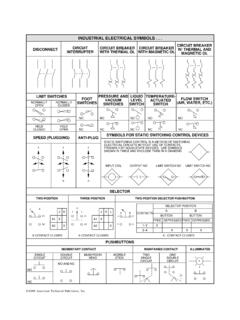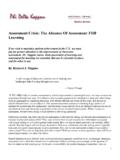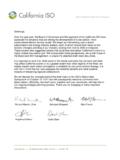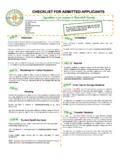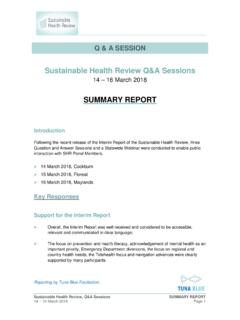Transcription of Perkins Grant Overview - SUNY Canton
1 Perkins Grant Overview Introduction: The Carl D. Perkins Career and Technical Education Grant is Grant funding that is awarded from the US Government to the states and then allocated to various schools within New York State based on programs and student population numbers in the Career and Technical Programs. Below is an Overview of the program, some of its requirements and uses of the funds. This Grant is available in the Spring semester, usually late March and early April for submissions to be accepted by the grants Coordinator that will then be present to the Local Advisory Board who makes a recommendation to the Provost who then gives final approval. Those submissions are then incorporated into the final Grant proposal by the grants Coordinator and submitted in early May to NYSED.
2 The award year runs from July 1 June 30 of the following year. For further information, please contact the grants Coordinator at x7951. The Bulletin of The Statewide Plan for Higher Education sets forth the Board of Regents goals and objectives for the coordinated system of higher education in New York. The Statewide Plan focuses on major issues affecting the role of higher education in New York State and its service to its residents, workforce, and community. In their respective institutional plans, higher education institutions are asked to describe, consistent with their mission, ..how they collaborate with businesses and other organizations to identify issues that higher education can address through new research initiatives or preparation of a workforce with new knowledge and skills, and to devise effective ways to address those needs individually and in networks, thus advancing development of intellectual capital, the economy, and related needs of New York.
3 This focus complements the purpose of the Carl D. Perkins Career and Technical Education Act of 2006 ( Perkins IV): ..to develop more fully the academic, and career and technical skills of secondary education students and postsecondary education students who elect to enroll in career and technical education programs, by: 1. Building on the efforts of States and localities to develop challenging academic and technical standards and to assist students in meeting such standards, including preparation for high skill, high wage, or high demand occupations in current or emerging professions; 2. Promoting the development of services and activities that integrate rigorous and challenging academic and career and technical instruction, and that link secondary education and postsecondary education for participating career and technical education students; 3.
4 Increasing State and local flexibility in providing services and activities designed to develop, implement, and improve career and technical education; 4. Conducting and disseminating national research and disseminating information on best practices that improve career and technical education programs, services, and activities; 5. Providing technical assistance that: Promotes leadership, initial preparation, and professional development at the State and local levels; and Improves the quality of career and technical education teachers, faculty, administrators, and counselors; 6. Supporting partnerships among secondary schools, postsecondary institutions, baccalaureate degree granting institutions, area career and technical education schools, local workforce investment boards, business and industry, and intermediaries; and 7.
5 Providing individuals with opportunities throughout their lifetimes to develop, in conjunction with other education and training programs, the knowledge and skills needed to prepare individuals for high demand, high skill, or high wage occupations. The focus of The Statewide Plan and the purpose of the Act combine in challenging institutions to improve existing collaborations and thus advance the educational and economic needs of the State and its residents. ELIGIBLE AGENCIES AND PROGRAMS The State Education Department (SED) awards grants to degree-granting institutions and Educational Opportunity Centers (EOCs) that offer career and technical education below the baccalaureate level and generate $50,000 or more in postsecondary/adult formula funds, or to postsecondary institutions participating in consortia that meet the $50,000 minimum Grant requirement and offer collaborative career and technical education programs that will be of sufficient size, scope, and quality to be effective.
6 The Department uses formulas prescribed by Congress to allocate funds based on the population served. Perkins IV provides funds to improve the quality of career and technical education for students at degree granting institutions and EOCs. 1. Postsecondary Credit Programs. For postsecondary credit programs, the purpose is twofold: (1) to provide students with academic, career and technical knowledge needed to prepare for further education beyond a two-year associate degree and (2) for a career in current or emerging high demand, high skill or high wage occupations. The basic Grant application should describe how the institution will ensure that this education will include competency-based applied learning techniques that contribute to the academic knowledge, higher-order reasoning and problem-solving skills, work attitudes, general employability skills, technical skills, and occupation-specific skills of an individual.
7 The application also should describe how the program integrates academic and career and technical education through a coherent sequence of courses so students achieve academic, career and technical competencies. 2. Adult Noncredit Career and Technical Education Programs. The purpose for adult noncredit career and technical education programs is to prepare students for direct entry into employment in high demand, high skill or high wage occupations. Institutions receiving funds should describe how the institution will provide a program that integrates academic and career and technical education through a coherent sequence of courses. SED encourages articulation of adult noncredit career and technical education programs with related secondary and/or postsecondary curricula.
8 Other adult programs, such as basic skills, bilingual or English as a Second Language (ESL), life management, and the General Educational Development Program (GED) may be funded only if they are offered in integrated curricula with career and technical education programs. 3. External Coordination. The application should describe how the institution will coordinate services with community-based organizations (CBOs), local employment and training activities, activities connected with implementation of the Local One-Stop delivery system, and services available through local Vocational Rehabilitation offices to avoid duplication of services and to expand the range and accessibility of services. Local job developers and placement coordinators working for other clients and supported by other funding sources should be identified and, if possible, used to provide the same services for Perkins IV clients.
9 Major Effort Description for FY '13 including: Mandated Activities across Major Efforts Under Section 135 (b) of Perkins IV, institutions shall use Perkins IV non-competitive formula funds to support one or more of the following nine activities: (1) Strengthen the Academic, Career and Technical Skills of Students Strengthen the academic and career and technical skills of students participating in career and technical education programs, by strengthening the academic and career and technical education components of such programs through the integration of academics with career and technical education programs through a coherent sequence of courses such as career and technical programs of study ; (2) Link Career and Technical Education at the Secondary Level and Career and Technical Education at the Postsecondary Level, including by offering the relevant elements of not less than 1 career and technical program of study ; (3) Provide Students with Strong Experience In and Understanding Of All Aspects of an Industry, which may include work-based learning experiences.
10 (4) Develop, Improve, or Expand the Use of Technology in Career and Technical Education, which may include: "training of career and technical education teachers, faculty, and administrators to use technology, which may include distance learning "providing career and technical education students with the academic and career and technical skills (including the mathematics and science knowledge that provides a strong basis for such skills) that lead to entry into the technology fields ; or "encouraging schools to collaborate with technology industries to offer voluntary internships and mentoring programs"; (5) Provide Professional Development Programs to Teachers, Counselors, and Administrators, including: "inservice and preservice training in effective integration and use of challenging academic and career and technical education provided jointly with academic teachers to the extent practicable, effective teaching skills based on research, and in effective practices to improve parental and community involvement and effective use of scientifically based research and data to improve instruction.



